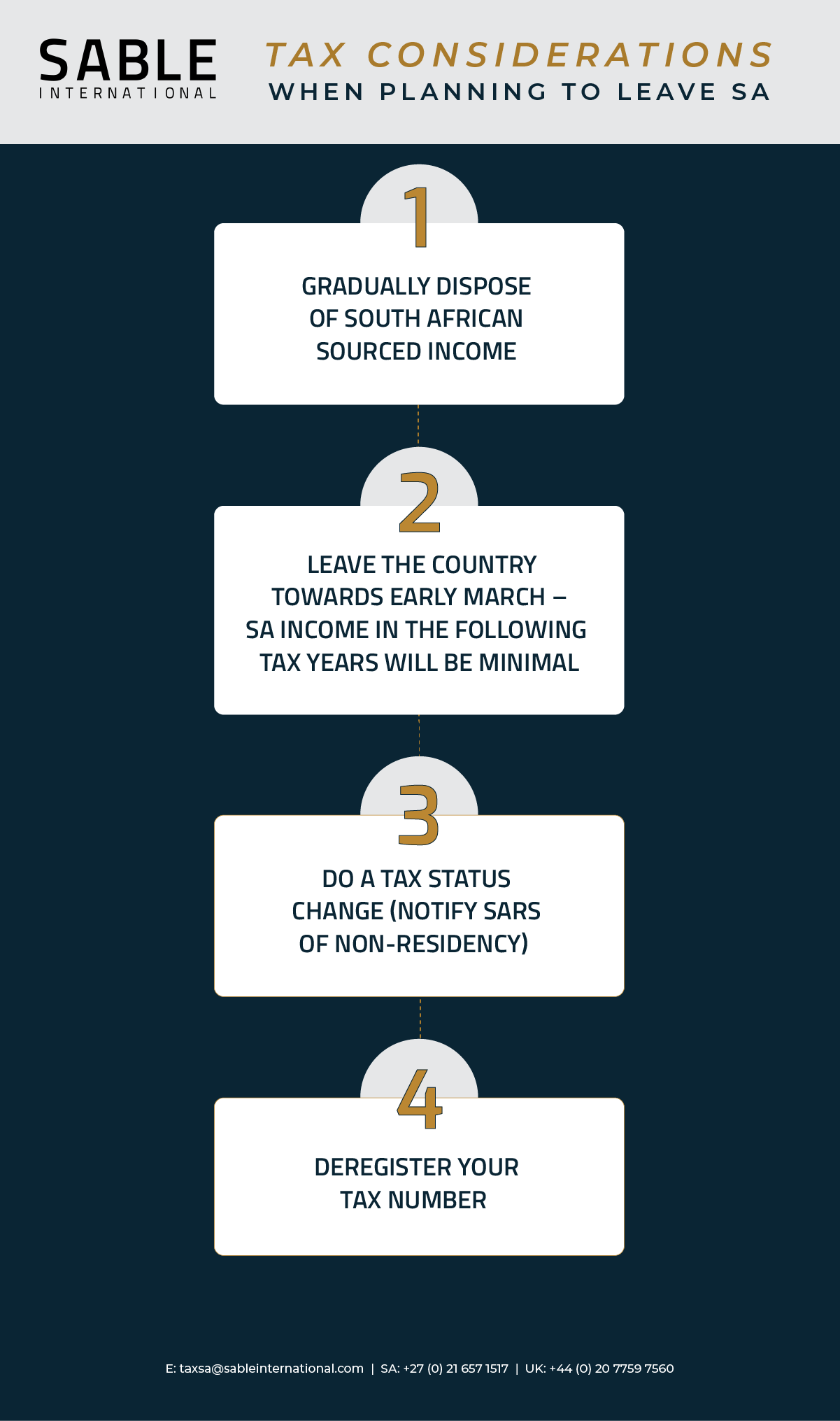
When should I inform SARS that I am leaving South Africa?
If you plan to leave, it is in your best interest to gather evidence of your intention to establish a life in another country, as you will need to prove to SARS that it is your end goal to permanently immigrate from South Africa. You cannot prove this on the day of your departure and should do so before your next tax return. This way you have the opportunity to check if you can truly make the other country home before informing SARS.
Bear in mind that the exact number of days you spend in each country is important when it comes to tax, so you should keep a record, especially if you plan to frequently travel back to South Africa. We suggest you keep your visits to South Africa to a minimum before you tax emigrate so your tax residency status is not impacted.
If you are not a SA tax resident but spend time in SA you need to look at the physical presence test to see if you are technically considered physically present in South Africa and therefore tax resident in South Africa. SARS will also require a tax residence certificate or letter from your new tax jurisdiction and, if you have not been in the country long enough, it may be difficult to obtain this letter. The amount of time you need to spend in the other country to be considered tax resident will vary from country-to-country.
How does my asset base affect my tax residency status?
If you plan to leave South Africa and your only asset is cash and South African property, you will need to notify SARS that you have left the country and do a tax residency status change.
South African exit tax
Exit tax is calculated on the market value of all your worldwide assets, including:
- Foreign immovable property
- Shares (foreign and local)
- Investments (foreign and local)
It is possible to avoid the exit tax by selling assets as a South African tax resident before tax emigrating and this can delay the cashflow of your tax payments. For example, if you leave in March and own R1 million worth of unsold shares, you will be deemed to have sold those shares. If you sold the shares in March before you left, you trigger this as a SA tax resident. The tax is due in February of the next year at the earliest with your provisional tax payment of that tax year.
What are the five main exit tax triggers?
There are five main scenarios to consider which include:
- Individuals who have shares in South Africa
- Individuals who have foreign property or shares outside of South Africa
- A South African company owner
- Individuals linked to trusts
- Individuals who have high-value personal items (luxury items subject to capital gains tax)
These include people who have retirement funds in South Africa. If you are close to retirement age, you will need specific advice from a tax practitioner or a financial advisor (who has advisory knowledge in both tax jurisdictions) to prevent problems further down the line. There are two types of retirement funds to consider.
- Retirement annuities (RA) – You do not have to worry about these for three years (after three years, you are no longer subject to South African tax laws on your RA funds). Consider whether or not you want to keep them and contribute to them.
- Pension and provident funds – It's important to know when withdrawals are triggered because double taxation agreements, for example, can override the normal rules.
Our tax practitioners can review your options and give you an idea of when you need to deal with these types of assets.
See also: Emigrating from South Africa? Here’s your ultimate tax emigration guide
Will I need to continue filing normal tax returns in South Africa?
It is best to continue filing tax returns in South Africa as long as you have an active tax number, whether there is a continuation of a South African sourced income or not. SARS has been issuing admin penalties for non-submission of tax returns, regardless of whether you’ve changed your tax status, and trying to fight this from abroad is more difficult than simply logging a return.
After changing your tax status, the next step would be deactivating your tax number. This indicates to SARS that you have no assets or income streams in South Africa and do not need to file tax returns (assuming you have no SA assets or income streams).
Will it benefit me to keep my South African tax number active?
The only reason you should keep your tax number active is if:
- You plan to return to South Africa in the near future (two to five years)
- You are expecting to own South African-sourced asset in the near future (such as an SA property)
- You have SA sourced income

When is the best time to get in touch with a tax practitioner?
From a South African perspective, the beginning of the tax year is usually the best time to leave, so it is advisable to get in touch with a tax practitioner before this. If you have very little South African-sourced income and there's a capital gain, you can reduce the tax due on the capital gains triggered, as much as possible.
The complexity of your circumstances will determine how soon you should speak with someone. We recommend you do this at least six months (or earlier) to reduce stress around your move date. If you have a larger asset base, which can trigger CGT, you’ll want to do this even sooner. If you begin early enough, you can consider what is best for you in that new jurisdiction based on your asset base and what your future needs are from your assets in the near future.
